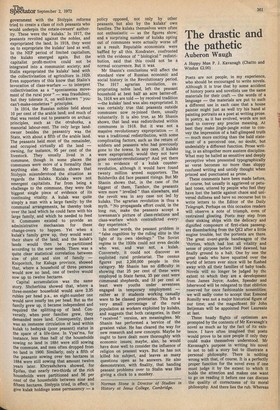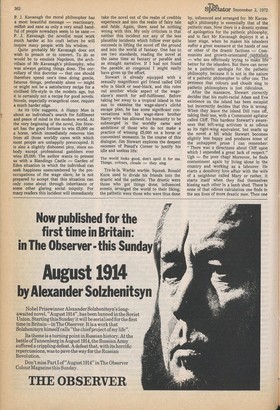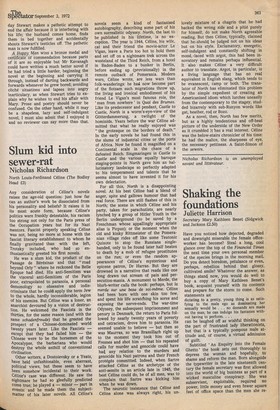The drastic and
the pathetic
Auberon Waugh
A Happy Man P. J. Kavanagh (Chatto and Windus £2.00) Poets are not people, in my experience, who should be encouraged to write novels. Although it is true that by some accident of history poets and novelists use the same materials for their craft — the words of a language — the materials are put to such a different use in each case that a house painter might just as well try his hand at painting portraits as a poet at writing prose. In poetry, as it has evolved, words are not used to convey any precise meaning. At best they make jingle-jangle noise to convey the impression of a half-glimpsed truth — much more exciting than the bald statement of a perceived one, no doubt, but undeniably a different function. Prose writing, is an altogether more austere discipline. What may be hailed as sensitive and deeply perceptive when presented typographically as verse becomes no more than sloppy confused writing and untidy thought when printed and punctuated as prose.
These comments have been made before, of course, but usually in aggrieved or petulant tones, uttered by people who feel they have lost the battle against chaos and universal dullness and have no recourse but to write letters to the Editor of the Daily Telegraph. Perhaps on this occasion readers will observe a note of triumph, even of restrained gloating. Poets may step from their sinking ships with the delicacy and dignified composure of first-class passengers disembarking from the QE2 after a little engine trouble, but the portents are there. The great avant-garde bandwagon of the 'thirties, which had lost all vitality and sense of parpose before 1940 dawned, has finally ground to a halt. One by one the great toads who have squatted over the world of letters ever since will be flushed away with all their families of baby toads. Novels will no longer be judged by the extent to which they are a development from James Joyce; Auden, Spender and Isherwood will be relegated to that oblivion reserved for once fashionable nonentities; we will sadly come to accept that Esmond Romilly was not a major historical figure of our time; and the magnificent Sir John Betjeman will be appointed Poet Laureate at last.
These heady flights of optimism are prompted by the contents of Mr Kavanagh's novel as much as by the fact of its existence. I have often imagined that poets would prove to be nice people if only they could make themselves understood. Mr Kavanagh's purpose in writing his novel is not to tell a story but to illustrate a personal philosophy. There is nothing wrong with that, of course. It is a perfectly proper function for the novel even if one must judge it by the extent to which it holds the attention and makes one want to go on reading it before one can discuss the quality of correctness of its moral philosophy. And there lies the rub. Whereas P. J. Kavanagh the moral philosopher has a most beautiful message — reactionary, selfish and sane as only a very small handful of people nowadays seem to be sane — P. J. Kavanagh the novelist must work much harder at his craft before he will inspire many people with his wisdom.
Quite probably Mr Kavanagh does not wish to preach or to convert. To do so would be to emulate Napoleon, the archvillain of Mr Kavanagh's philosophy, who was always getting things done. The corrollary of this doctrine — that one should therefore spend one's time doing gentle, fatuous things, preferably alone — might or might not be a satisfactory recipe for a civilised life-style in the modern age, but it is certainly not a recipe for good novels. Novels, especially evangelical ones, require a much harder edge.
As its title suggests, A Happy Man is about an individual's search for fulfilment and peace of mind in the modern world. At the very beginning of the novel, Jim Stewart has the good fortune to win £5,000 on a horse, which immediately removes him from all those worldly cares with which most people are unhappily preoccupied. It is also a slightly dishonest ploy, since nobody except professional gamblers ever wins £5,000. The author wants to present us with a Blandings Castle — Garden of Eden situation in which the individual can seek happiness unencumbered by the preoccupations of the wage slave; he is not prepared to accept that this situation can only come about through inheritance or some other glaring social iniquity. For many readers this incident will immediately take the novel out of the realm of credible experience and into the realm of fairy tale and •fable. Again, there need be nothing wrong with this. My only criticism is that neither this incident nor any of the less plausible incidents which follow ever quite succeeds in lifting the novel off the ground and into the world of fantasy. One has to use two standards, reading the novel at the same time as fantasy or parable and as straight narrative. If I had not found the parable so congenial I might easily have given up the effort.
Stewart is already equipped with a sexually magnificent girl friend called Dill who is black or near-black, and this rules out another whole aspect of the wageslave's search for self-fulfilment. Before taking her away to a tropical island in the sun to examine the wage-slave's cliché escape plan, he has some significant conversations with his wage-slave brother Harry who has allowed his humanity to be submerged in the worldly cares and ambitions of those who do not make a practice of winning £5,000 on a horse at convenient moments. In the course of this dialogue, Jim Stewart explores the deepest recesses of Pseud's Corner to justify his idle and useless life:
The world looks good, don't spoil it for me. Things, colours, clouds — they sing.
Tra-la-la. Warble warble. Squeak. Ronald Kncix used to divide his friends into the drastic and the pathetic. The drastic were those who got things done, influenced events, arranged the world to their liking; the pathetic were those who were thus done by, influenced and arranged for. Mr Kavanagh's philosophy is essentially that of the pathetic man. Now there is a drastic system of apologetics for the pathetic philosophy, and in fact Mr Kavanagh deploys it at a later stage, when he makes his islanders suffer a great massacre at the hands of one or other of the drastic factions — Communists and growth-orientated,capitalists, — who are officiously trying to make' life" better for the islanders. But there can never be a pathetic apologia for the pathetic philosophy, because it is not in the nature of a pathetic philosopher to offer one. The pretence that colours and clouds sing to pathetic philosophers is just ridiculous.
After the massacre, Stewart correctly decides that his multi-racial Adam and Eve existence on the island has been escapist but incorrectly decides that this is wrong. When they leave the island Dill runs off, taking their son, with a Communist agitator called Cliff. This hardens Stewart's awareness that left-wing activism is as odious as its right-wing equivalent, but snarls up the novel a bit while Stewart becomes slightly less happy and produces some of the unhappiest prose I can remember: "There was a directness about Cliff upon which I expended a great lack of respect." Ugh — the poor chap! Moreover, he finds contentment again by living alone in the country and working as a labourer. He starts a desultory love affair with the wife of a neighbour called Mary or rather, it starts itself when they find themselves kissing each other in a lamb shed. There is none of that odious calculation one finds in the sex lives of more drastic men. Then one day Stewart makes a pathetic attempt to end the affair because it is interfering with his life; the husband comes home, finds them in bed together and accidentally shoots Stewart's testicles off. The pathetic man is now fulfilled.
A.tfappy Man wins a bronze medal and certificate -of commendation because parts of it are so enjoyable but Mr Kavanagh could have written a much better novel if he had tried a little harder, beginning the novel at the beginning and carrying it through, instead of darting backwards and forwards whenever he grew bored; avoiding' cliche situations and lapses into angry inarticulacy, as when Stewart tries to explain why he wishes to end his affair with Mary. Prose and poetry should never be confused. On the other hand, while it may be a shapeless, lazy and self-indulgent novel, I must also admit that I enjoyed it and no reviewer can say more than that.








































 Previous page
Previous page